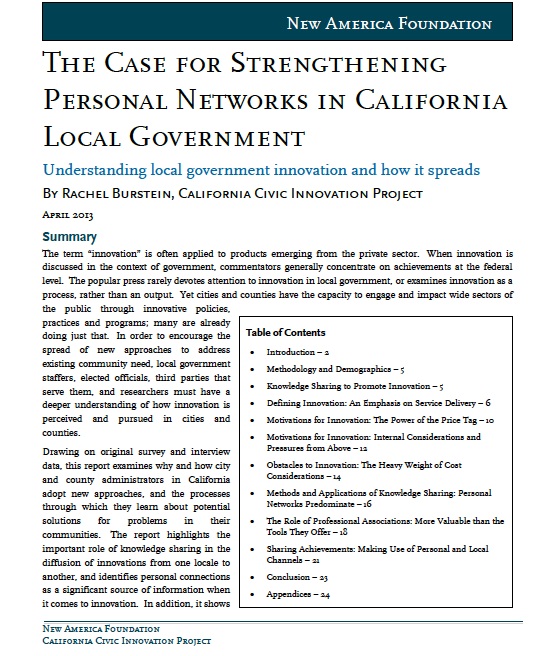Originally posted at the New America Foundation.
By Rachel Burstein.
The term “innovation” is often applied to products emerging from the private sector. When innovation is discussed in the context of government, commentators generally concentrate on achievements at the federal level. The popular press rarely devotes attention to innovation in local government, or examines innovation as a process, rather than an output. Yet cities and counties have the capacity to engage and impact wide sectors of the public through innovative policies, practices and programs; many are already doing just that. In order to encourage the spread of new approaches to address existing community need, local government staffers, elected officials, third parties that serve them, and researchers must have a deeper understanding of how innovation is perceived and pursued in cities and counties.
Drawing on original survey and interview data, this report examines why and how city and county administrators in California adopt new approaches, and the processes through which they learn about potential solutions for problems in their communities. The report highlights the important role of knowledge sharing in the diffusion of innovations from one locale to another, and identifies personal connections as a significant source of information when it comes to innovation. In addition, it shows the obstacles faced by local government leaders who hope to pursue new approaches. Among the report’s key findings are the following:
- City and county administrators perceive the exchange of information related to innovation in local government as vitally important to the effective diffusion of innovation from one locale to another.
- Local government staffers often cite internal organizational and managerial processes — especially those concerning service delivery — as innovative, rather than concentrating on truly new or public-facing programs.
- A desire to reduce costs and/or increase organizational efficiency is the most significant motivation for innovation in local government, while lack of resources — financial, human and time — is a significant obstacle to innovation.
- Local government administrators are deeply concerned with addressing community need, but the influence of community members and civic opposition in developing proposed solutions is relatively muted.
- The vision and leadership of elected officials and legislative mandates can be powerful reasons for investigating and adopting new approaches in local government, though both factors can also result in less-than optimal solutions to problems.
- When it comes to receiving and sharing knowledge around innovation, local government administrators rely primarily on personal contacts, particularly those working in similar positions within the same geographic area.
- Those working in local government view professional associations as a moderately valuable source as they research and implement new approaches, but they regard the specific technological tools and knowledge sharing programs offered by such associations as less valuable.
- There are significant divides between urban and rural communities when it comes to perceptions of civic innovation and the ways in which knowledge about innovation is acquired and shared.
Together these data serve as a starting point for a conversation about which specific practices and programs can advance effective knowledge sharing for the purpose of encouraging innovative programs that ultimately produce more adaptive and responsive local governments.
Download a copy of The Case for Strengthening Personal Networks in California Local Government here.
* * *

This work is licensed under a Creative Commons Attribution-NoDerivs 3.0 Unported License.





